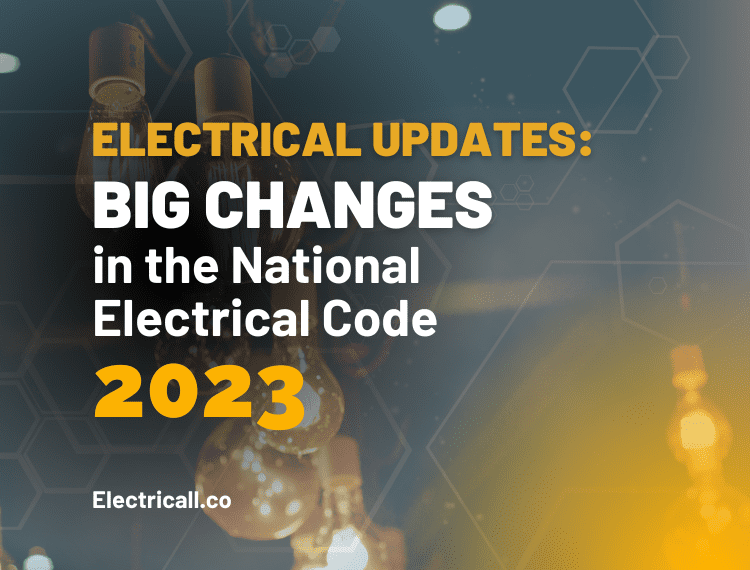
Electrical Updates: Big Changes in the National Electrical Code 2024
As we approach 2024, electrical contractors and property owners continue to navigate the laws to maintain a safe property. As we continue to keep our properties at their best, it is vital to learn and implement the significant amendments to NEC.
Here are some big changes to the 2024 National Electrical Code. This list includes articles that will affect Arvada, CO homeowners, and local electricians.
New NEC Articles
There are multiple new articles proposed to improve the existing National Electrical Code. The additions aim to focus on electrical requirements, especially voltage requirements. Here are some changes to know:
- NEC 231
This new code addresses the concerns surrounding alternative energy systems. It covers the requirements for interconnecting with electric utilities.
- NEC 245
This additional article tackles the requirements of overcurrent protection. Under 245, systems that are over 1000 volts AC and 1500 volts DC must have overcurrent protection. The codes 240 and 490 are tied with this article.
- NEC 312.8
The need for additional bending space for 4 AWG and larger conductors is what 312.8 is all about.
- NEC 312.10
This section highlights the new requirements for screws or fasteners. In this code, the screws to be used for electrical boxes should pass the criteria. That is, to increase safety measures and to avoid damaging the conductors.
- NEC 315
This new article covers the requirements for medium voltage conductors. It also sets the requirements for cables, cable terminations, and joints.
- NEC 411.3
There is an added section to this code, putting emphasis on voltage limitations.
Modifications on the Requirements for Receptacles
These six National Electrical Code articles talk about receptacle rating and type. It covers the general requirements for installation and requirements for wet locations.
- NEC 110.28
This section has been changed to include informational notes on enclosure types. Some types that are included are panelboards, power outlets, switchboards, and circuit breakers.
- NEC 210.8(A)
This article pertains to the GFCI protection requirement for 15- to 20-ampere receptacles. The GFCI requirement is especially vital for outlets located 6 feet from a kitchen sink.
- NEC 210.12
Aside from GFCI protection, NEC also requires AFCI protection in several locations. AFCI is installed to complement the GFCI receptacles against electrical shock.
- NEC 406.3(C) and (D)
The title for 406.3(C) will be CO/ALR Receptacles. This kind can be directly connected with aluminum conductors. The (D) section is an addition. It requires 15A and 20A receptacles that are not CO/ALR to use copper-clad aluminum conductors.
- NEC 406.4
This section changes the general installation requirements for receptacles. GFCI or tamper-resistant receptacles are now required.
- NEC 406.9 (B) and (C)
This section outlines the requirements when installing outlets near wet locations. Sockets that have 15A and 20A, 125-volt, and 25-volt must have weatherproof enclosures. This article also clarified the electrical installation requirements for weight-supporting ceiling receptacles.
Guidelines for Wiring and Protection
The National Electrical Code has firm stipulations for electrical wiring. The standards will apply when installing, repairing, or performing maintenance. Some changes that aim to increase protection include:
- NEC 215.18
This is an added section. Under this code, dwellings are now required to have surge protective devices. Apartments, dormitories, hotels, and motels that use feeders must also follow this code.
- NEC 220 and 225
This tackles the changes related to load calculation. It also covers the surge and emergency disconnect requirements.
- NEC 250
The changes to this section are related to grounding and bonding requirements.
- NEC 300
This code lays out the general requirements for electrical wiring methods and materials.
Electrical Installation Requirements
Here are some codes that tackle the general rules to keep in mind when doing electrical work. Arvada electricians must follow these new standards when setting up home equipment.
- NEC 110
The title for this article has been revised, adding the term “general.” The modification best describes the entirety of the requirements for electrical installations.
- NEC 314.27(C)
Some homes were built with a ceiling fan pre-wire and have the homeowners install their own fans. This revised section is all about ensuring ceiling fan boxes can hold the fan in place.
- NEC 440.8
The revision to this code pertains to the refrigeration of air conditioning systems. Under 440.8, mini splits are prohibited to be installed or placed in a bathroom. And they should never be placed near shower space or the rim of the tub.
The changes to the National Electrical Code are complex. There are new articles, revised titles, and deleted or moved sections. And all Arvada electricians must follow the changes. That is the only way to ensure safe electrical work.
Call a residential electrician when doing a home renovation that requires a home rewiring job or installation. The expertise of local electricians in Arvada will help complete electrical work safely.
Need an Electrician in Arvada, CO?
ElectriCall works with residential and commercial customers for many electrical works. We are a trusted Arvada electrician that can help with electrical installations. We have performed numerous successful electrical repairs and maintenance in the Arvada area.
Whether small or big electrical projects, our expert electricians can help. For professional electrical services or more electrical safety tips, call us.